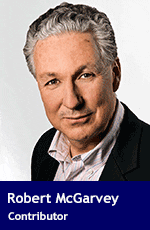 It happened just after I arrived in London to establish a United Kingdom branch office many years ago.
It happened just after I arrived in London to establish a United Kingdom branch office many years ago.
The seeds were probably sown the day I hired my secretary Elise. Elise had been secretary to former U.K. prime minister Harold Wilson when he was at the British government’s Board of Trade. And she was a real gem. No sooner had we sorted out employment details than she sat me down and proceeded to investigate me, as earnestly as possible.
As I got to know Elise, it seemed to me that the Brits did the whole “old boy” thing absolutely right. Elise, as my executive secretary, would organize the office, arrange my day, write all my letters, prepare my appointments, answer the phones and – basically – anticipate any problems and solve them before they bothered me.
My role was reduced to taking clients out for lunch.
Meanwhile, the world-at-large was changing – and fast. Newly-elected Prime Minister Margaret Thatcher had just returned from a successful conference in Salisbury, Rhodesia. Thatcher had negotiated a final settlement in the civil war that had been raging between the minority-controlled regime of Ian Smith and rebel leader Robert Mugabe.
At the very moment I was setting up shop in London, the rebel leader was emerging from hiding and flying to London for emergency talks with the British government and other interested parties.
One of the interested parties was a certain venerable old city firm with colonial-era mineral leases in Rhodesia (now Zimbabwe). They had been frantically calling officials in the Foreign Office attempting to arrange a meeting with the new leader, Mugabe. They were concerned (with good reason) that the new regime would cancel their leases and foil their plans.
It was about this time that Elise picked up the phone and called the secretary to the chief executive officer of the firm. Elise had a decidedly upper-crust accent, which meant Rs were not well pronounced. And, unfortunately, she had only a fleeting notion about what we were doing. She tended to describe our situation thusly: “Mr. Mcgav’y has recently arrived in London and would like to meet with your senior executive team to discuss leases and other important matters.“ The excited secretary’s response on the other end of the line can only be imagined, but when Elise suggested that “he’ll be available for a luncheon on Friday,” it was pull-out-all-the-stops.
Friday was one of those luxurious autumn days in London, crisp and brilliant. I remember humming as I rolled through the streets in my London black cab. I imagined another nice lunch, with the added benefit that it was taking place in the client’s famous walnut-panelled boardroom (at their expense). That was a switch.
The company’s offices were in a famous Georgian square in London. It was a self-contained world with vaulted gates guarding a host of classical three-storey period buildings on the perimeter of a private inner courtyard.
As I drove through the gates, I was surprised to see the yard crowded with people and even more surprised to discover giant flags draping the buildings – Union Jacks (of course) but also a very colourful new flag that I didn’t recognize.
I wondered what was going on.
Slowly, as I surveyed the excited kitchen staff in their black and whites, the technical staff lined up like school boys and a host of other office workers assembled anxiously, I began to get the drift.
Oh no, it couldn’t be!
But it was. There before the front doors of this palatial office stood the towering figure of the CEO, a famous titan of British industry, and his august board of directors, many having hurried over from the House of Lords for this grand ‘state’ occasion.
My first instinct was to flee, to reverse rapidly out of the courtyard and melt away into the busy streets. On the other hand, it wasn’t my fault they’d got it wrong. I had nothing to hide or be ashamed of. Besides, when was I going to get another shot at these guys?
No, it was sink or swim time for the young McGarvey and I was going to give it the old college try.
As I emerged from my cab, I could see the CEO glance quickly in my direction wondering who I was – advanced security perhaps? Satisfied that I was nobody important, he quickly resumed his imperious demeanour and icy, but hopeful, stare.
The next few moments remain a blur. I do remember that my heart was pounding so hard that it drowned my composure, and that I advanced step by step, as if in slow motion. Once I was directly in front of the CEO (who towered over me), I remember holding out my hand and announcing, “Good afternoon, I’m Robert McGarvey from Calgary. I believe I’m your guest for lunch.”
Then the world stopped.
After what seemed like an eternity, the reality of the situation (and his humiliation) dawned. I remember he had icy blue eyes and feeling their Cyclops-like power as they drilled into me, freezing me in my tracks.
Thinking back, there was a moment where he was so angry that I’m sure he wanted to strangle me with his bare hands.
I recollect that at this point, I mustered my courage and said in as strong a cowboy accent as I could muster, “I see there’s been a case of mistaken identity here; sorry I’m not the president of whatever, but believe me I have some important North Sea business I’d like to discuss with you all.”
Everyone in the courtyard gasped, audibly, and I could sense the fear behind the eyes. The atmosphere was pregnant with anxiety and you could almost feel the silent whisper: “Thank God the press wasn’t called!”
The CEO, having overcome his initial murderous rage, finally sighed, looked down at me and smiled. “Well, why not – it’s our mistake.” Then more quietly, in an aside, “You’d better be good, I’ve put on a state dinner and opened the best wine in our cellars. Everyone’s expecting a prime minister.”
Relieved to be alive, I responded with, “I’m sure you’ll find Canadians more reliable business partners than those rebels from Zimbabwe.”
With that, he started laughing. Around the square, you could feel the relief as nervous chatter began to move wave-like through the crowd. Thank God!
As we walked through the doors, a friendly arm now on my shoulder, he whispered to me, “Robert I forgot to mention, you’re scheduled to give a speech. I hope you’re up for it.”
Gulp. No problem, I thought, I’ll dust off that Canadian bluster I’d been handing out freely in the pub – that’s just the sort of thing this crowd would love to hear.
Robert McGarvey is an economic historian and former managing director of Merlin Consulting, a London, U.K.-based consulting firm. Robert’s most recent book is Futuromics: A Guide to Thriving in Capitalism’s Third Wave.
Robert is a Troy Media Thought Leader. Why aren’t you?
The views, opinions and positions expressed by columnists and contributors are the author’s alone. They do not inherently or expressly reflect the views, opinions and/or positions of our publication.

